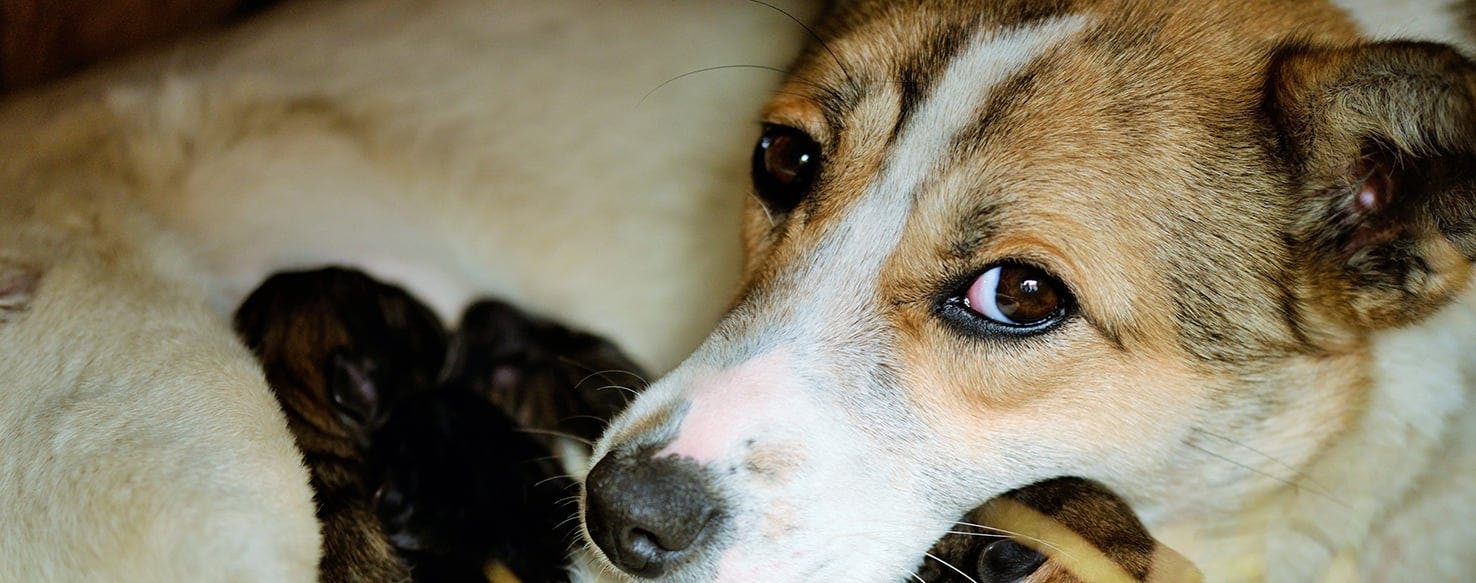The best place for your pregnant dog to give birth is at home in familiar surroundings. This can help to ensure fewer complications and problems during birth and the few critical hours following. However, pregnancy and whelping do not come without their share of risks and potential complications. This is why it is important that you learn--before the arrival of your new litter--exactly what to look for and how to care for both mom and puppies when they arrive. Birth and nursing will take their toll on your dog and understanding how to help her recover will ensure that she and her puppies remain strong and healthy.
Postpartum Care Starts During Pregnancy
The best way to ensure that your dog stays healthy through birth and nursing is to ensure she is healthy prior to delivery. This means making sure that your dog has regular trips to the vet and is fed a healthy diet suitable for pregnant dogs. Check with your vet to determine the best food and amounts to feed your dog both prior to delivery and when she is nursing. By the time puppies are three to four weeks old, your dog may need up to three times as much food as she did prior to pregnancy.
Setting up a familiar, quiet place for your dog to have her puppies can also help with many of the problems new moms face. Let her spend time in the area where you intend for her to deliver prior to her delivery date. Make sure the space is warm and comfortable and that food and water are easily available. The more comfortable your dog is the less risk that she might become nervous, causing harm to her puppies or reject them.
After Care
Because you are allowing your dog to deliver her puppies at home, it will be up to you to know what to look for as she delivers and in the crucial 72 hours after birth. Death rates can be as high as 40% in the first four weeks, but staying on top of care especially right after delivery can dramatically reduce that rate.
Once your dog appears to have finished having her puppies you should do a quick check to feel for any puppies remaining in her uterus. It is also important to make sure that all the placentas have been expelled. If you suspect that there are still puppies or placentas in your dog’s uterus, it is time to make a trip to the vet to have her checked.
Discharge should be dark in color and completely odorless. If, at any time, the discharge becomes thick or begins to look like pus and has a foul odor it is time to take your dog to the veterinarian. This usually indicates some type of infection and can indicate placental retention, which needs to be treated immediately. Discharge should lessen in amount in a few days, but some light discharge during the nursing period is normal.
Other Concerns
Dogs often do not eat right away after birth but should start to eat within the first 24 hours. Make sure there is food available and that it is initially softened with a bit of water to make it easier to digest. Now is not the time to add extra foods as a treat or an enticement to get your dog to eat. Rich foods can cause more upset for both mom and puppies. If your dog does not begin eating on her own this could also be a sign of an internal problem such as infection.
Make sure to keep an eye on mammary glands and teats for signs of infection. Inspect and clean them daily. If they become swollen, hot, or painful there may be a problem and you should take your dog to the vet. Keep an eye on your dog for fever or lethargy, which are also signs she may have an infection.
The best advice is to have a close working relationship with your dog’s vet and to call him if you have any concerns at all about your dog or her puppies. Frequent checkups can catch problems before they get out of control. A good partnership between you and your vet can ensure that your dog maintains her good health and her puppies get the best start on life possible.


